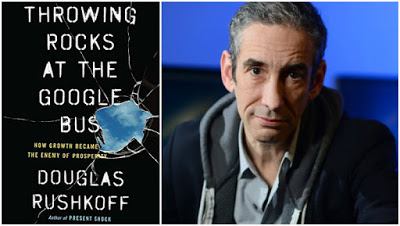Broadcast here April 4th 11 to 1 pm Eastern (1500 GMT). For only $3.95 a month you can listen to shows on-demand before they are broadcast – and also get free downloads and other perks from Kevin! If you are a subscriber, just log in to the members area of TruthJihad.com to get early access to the shows. Non-subscribers only get access to the No Lies Radio show archives the day after the broadcast here. Help Kevin keep these shows on the air – become a subscriber today! NOTE: AS OF TODAY, TRUTHJIHAD.COM IS UNDER CYBER-ATTACK. (HOPE TO GET IT FIXED SOON.) IF YOU WANT TO JOIN, EMAIL ME AT TRUTHJIHAD(AT)GMAIL{DOT}COM AND I’LL EXPLAIN THE WORK-AROUND.
 |
| Rushkoff’s new book is a brilliant critique of our socio-economic software |
In ANOTHER French False Flag, Eric Walberg argues that false flag conspiracies are less important than “the capitalist conspiracy holding us all hostage.”
Media studies icon Douglas Rushkoff offers a similar argument. In his new book Throwing Rocks at the Google Bus (and in this interview) Rushkoff explains why the crisis afflicting the digital economy is just an extreme manifestation of bankster-driven corporate capitalism – the 500-year-old “grow-or-die” usury-money monopoly-based system designed to concentrate wealth in ever-fewer hands by draining it out of local communities. The best way to fight back, he says, is to develop resilient local networks, both on-line and real-world, based on peer-to-peer sharing.
During the first half of this interview, Rushkoff discusses the larger argument laid out in his book, and makes a convincing case for redesigning our economic software to benefit ordinary people (and the ecosystem that sustains us) rather than banksters, CEOs, the investor class, military-industrial magnates, and other postmodern potentates.
In the second half of the interview, we argue about the significance of false flags in general and 9/11 in particular. Can false flag awareness shock people awake, discredit old institutions, and help stimulate necessary change? Or is there so much resistance to the complexities of “false flag truth” that other avenues are more productive? (Perhaps for some, but not for others?)
In the final analysis, do our positions oppose or complement each other? Listen and see what you think.
Winner of the Media Ecology Association’s first Neil Postman award for Career Achievement in Public Intellectual Activity, Dr. Douglas Rushkoff is an author, teacher, and documentarian who focuses on the ways people, cultures, and institutions create, share, and influence each other’s values. He is Professor of Media Theory and Digital Economics at CUNY/Queens, technology and media commentator for CNN, digital literacy advocate for Codecademy.com and a lecturer on media, technology, culture and economics around the world.
Douglas Rushkoff’s book Coercion inspired my viral article “Apocalypse of Coercion,” which analyzed 9/11 as a shock-and-awe trauma-based mind-control event.